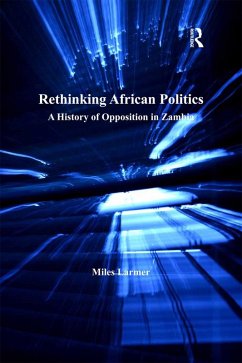This study examines the nature of government and political opposition in Zambia, in the years immediately following its independence in 1964. It shows how Kenneth Kaunda's United National Independence Party's (UNIP) grip on the new nation-state was, in contrast to official rhetoric, partial, uneven and consistently prone to challenge. Drawing on extensive archival research and interviews, Larmer offers a ground-breaking analysis of post-colonial political history which helps explain the challenges facing contemporary African polities.
Dieser Download kann aus rechtlichen Gründen nur mit Rechnungsadresse in A, B, BG, CY, CZ, D, DK, EW, E, FIN, F, GR, HR, H, IRL, I, LT, L, LR, M, NL, PL, P, R, S, SLO, SK ausgeliefert werden.


